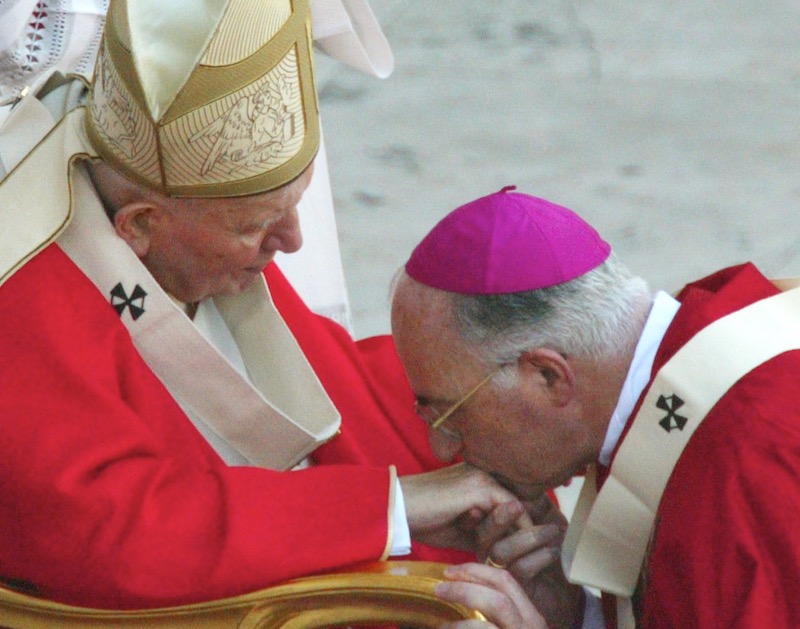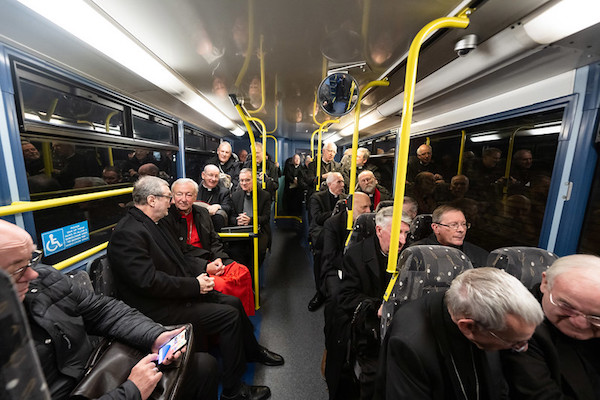The bishops of England and Wales are to petition the Vatican to recognise the memorial of Our Lady of Walsingham on 24 September as a feast in England.
This was one of nine resolutions issued following the bishops’ plenary meeting in Leeds last week. They directed the department for Christian life and worship to prepare the necessary texts to petition the Dicastery for Divine Worship and Discipline of the Sacraments in Rome.
Environmental matters, the universal synod, vocations and safeguarding were significant topics of discussion at the plenary. Resolutions on the environment included the request that diocese declare target dates and reports on emissions reduction, and commendation of CAFOD’s LiveSimply award scheme.
The bishops also noted the Cambridge University study, reported by The Tablet earlier this month, which found that observation of the Friday abstinence had reduced carbon emissions by 55,000 tonnes per year.
The Bishop of Salford, John Arnold, who is the conference’s lead on the environment, said that since the institution of the fast by Pope Nicholas I in the ninth century it “has been seen as a penitential and spiritual act, but now we can see it as having a very practical impact”.
A resolution on the proposal to introduce buffer zones around abortion clinics described the measure as “disproportionate and unnecessary” with “implications [which] extend beyond the perimeters of an abortion clinic and raise questions about the state’s powers in relation to the individual in a free society”.
The bishops condemned “all harassment and intimidation of women” attending abortion clinics but said that mechanisms were already in place to protect them.
“There is a risk, despite any other intent, that existing and proposed measures constitute discrimination and disproportionately have an impact on people of religious faith.”
Bishop John Sherrington, an auxiliary in the Archdiocese of Southwark, said that it was essential for bishops “to listen well to those who have legal expertise”.
“This particular resolution come out of the context of listening,” he said, “to those who have supported the women who have benefited by those who gather outside abortion clinics, the legal expertise about criminalising activity and the meaning of the word ‘influence’, and the relationship with the European Convention on Human Rights.”
Other resolutions praised the visit of the relics of St Bernadette, and acknowledged a letter from the charity Women@thewell regarding the situation of prostituted women.
Speaking after the plenary on 18 November, the Bishop of the Forces, Paul Mason, the conference’s lead on safeguarding, said that the bishops had reviewed training materials from the Catholic Safeguarding Standards Association and reports on pilot audits of diocesan safeguarding practices.
The bishops also discussed the recommendations of the Independent Inquiry into Child Sexual Abuse. Bishop Mason said that the inquiry’s specific recommendation on mandatory reporting even of disclosures under the seal of the confessional displayed “a degree of incomprehension”.
Bishop Sherrington added that the Church has “a task of communicating our understanding of the seal of confession”.
Bishop Nicholas Hudson, an auxiliary in the Archdiocese of Westminster, briefed the conference on the progress of the synod. He said that the documents produced affirmed “the deep love that is at the heart of the Church”.
He noted, however, that 90 per cent of Catholics in England and Wales had not yet taken part in synodal discussions. “We need to continue listening to our context,” he said, and “to try to listen better”.
Responding to questions on the cost-of-living crisis, Bishop Hudson said that the “new evangelisation” fostered by the synod demanded a closer engagement with the poor, visible in the food banks and voucher schemes run by many churches.
“There is an opportunity for us to ask ourselves: how do we make [these initiatives] more evangelising?” he said.
Bishop Mason said that the crisis was an opportunity to foster vocations: “When the Church is seen to be working in a way of outreach and reaching out to the poor, we shine.”
He continued: “Especially when young people see that we’re engaged in the issues of the day it’s a great boon to vocations.”
He said that Pope Francis “would have us getting out into the field hospital” of a society affected by economic crisis, and added that, regarding questions of policy, “structural injustices are more on the radar” of the Church.
A plenary resolution noted “the specific need to encourage vocations to the priesthood” and asked “that prayer for vocations finds a regular place in the life of every Catholic parish and community”.



 Loading ...
Loading ...